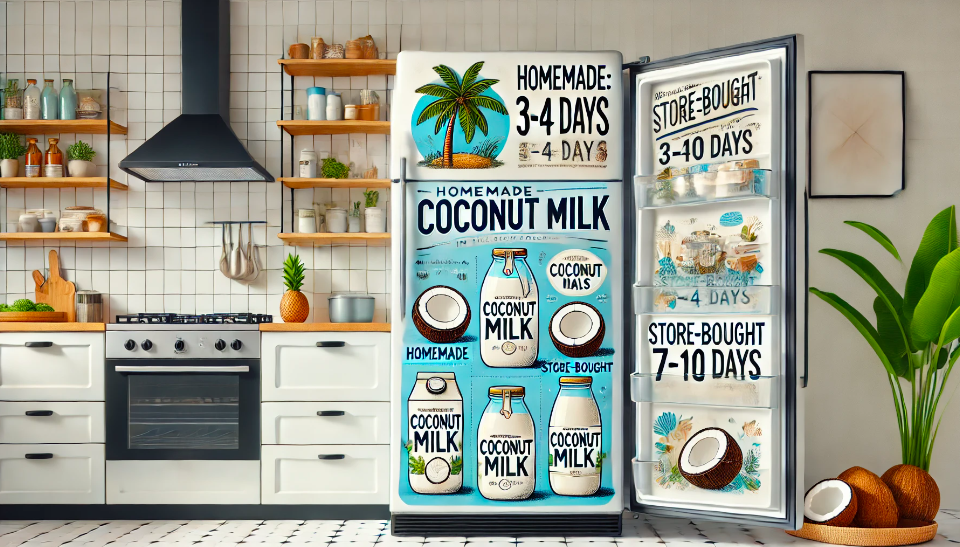
The shelf life of coconut milk in the fridge depends on its form (canned, fresh, or homemade) and whether it has been opened.
- Unopened Canned Coconut Milk: Typically lasts for several months past the printed "best by" date if stored in a cool, dry place. Once opened, it remains good for 5–7 days when refrigerated in an airtight container.
- Fresh or Homemade Coconut Milk: Fresh coconut milk has a much shorter shelf life, lasting about 3–4 days in the fridge. This is due to the absence of preservatives found in commercial products.
- Carton Coconut Milk (Refrigerated): Store-bought refrigerated coconut milk in cartons usually lasts for 7–10 days after opening. Always check the packaging for specific instructions.
Understanding The Shelf Life Of Coconut Milk
The shelf life of coconut milk is influenced by factors such as its type, storage method, and the presence of preservatives. Canned coconut milk lasts the longest due to airtight packaging and preservatives. Homemade coconut milk, however, lacks these protective factors and should be consumed quickly. Environmental conditions also matter; exposure to heat or light reduces its longevity. Always adhere to the manufacturer's "use by" dates for commercially produced coconut milk to ensure safety.
Signs Coconut Milk Has Gone Bad
Spoiled coconut milk exhibits the following signs:
- Unpleasant Smell: A sour or rancid smell is a strong indicator that it has gone bad.
- Separation and Curdling: While some natural separation is normal, a thick, chunky consistency or curdling is not.
- Mold or Discoloration: Visible mold or a change in color (e.g., from white to yellowish) signals spoilage.
- Unusual Taste: If it tastes sour or off, it is no longer safe to consume.
- Gas Build-up in Packaging: For unopened cans, bulging or dented packaging can indicate bacterial contamination.
Storage Tips To Extend Coconut Milk Freshness
To maximize coconut milk’s shelf life, follow these storage tips:
- Refrigerate Promptly: Always refrigerate after opening and store in an airtight container.
- Avoid Cross-Contamination: Use clean utensils when scooping out coconut milk to prevent introducing bacteria.
- Keep it Cold: Store coconut milk in the coldest part of the fridge, away from the door.
- Check Packaging Dates: Consume it before the “use by” or “best by” date for the best quality.
- Freeze Excess Milk: If you can’t use it within a week, freeze it for later use.
How To Properly Store Opened Coconut Milk
Once opened, transfer coconut milk from cans or cartons into an airtight container to prevent exposure to air. Glass or BPA-free plastic containers are ideal for this purpose. Label the container with the opening date and store it in the refrigerator. Always stir or shake well before use to redistribute the natural fats and solids that may separate over time.
Using Frozen Coconut Milk For Longer Shelf Life
Freezing is an excellent way to extend coconut milk's shelf life. Pour the milk into ice cube trays or freezer-safe containers, leaving some space for expansion. Frozen coconut milk retains its quality for up to 3 months. When ready to use, thaw it overnight in the fridge. Note that the texture may change slightly, with separation being common. Stir well after thawing for smoother consistency.
Difference Between Fresh And Canned Coconut Milk
- Fresh Coconut Milk: Made by blending grated coconut with water and straining the mixture, it has a short shelf life of 3–4 days when refrigerated. It lacks preservatives and has a lighter, more natural flavor.
- Canned Coconut Milk: Commercially processed and often contains preservatives, it can last for months unopened. It is thicker and creamier, with a more intense coconut flavor due to higher fat content.
Frequently Asked Questions About Coconut Milk Storage
- Can I drink coconut milk past its expiration date? If unopened and stored properly, canned coconut milk may be safe a few days past its "best by" date, but always check for signs of spoilage.
- Why does coconut milk separate in the fridge? Natural fats and water separate when chilled. This is normal; simply shake or stir it before use.
- Can I refreeze coconut milk after thawing? It is not recommended, as repeated freezing and thawing can degrade the texture and flavor.
- Is it safe to leave coconut milk out overnight? No, perishable coconut milk should not be left at room temperature for more than 2 hours to prevent bacterial growth.
- How can I tell if frozen coconut milk is still good? Check for freezer burn or a sour smell after thawing. If either is present, discard it.